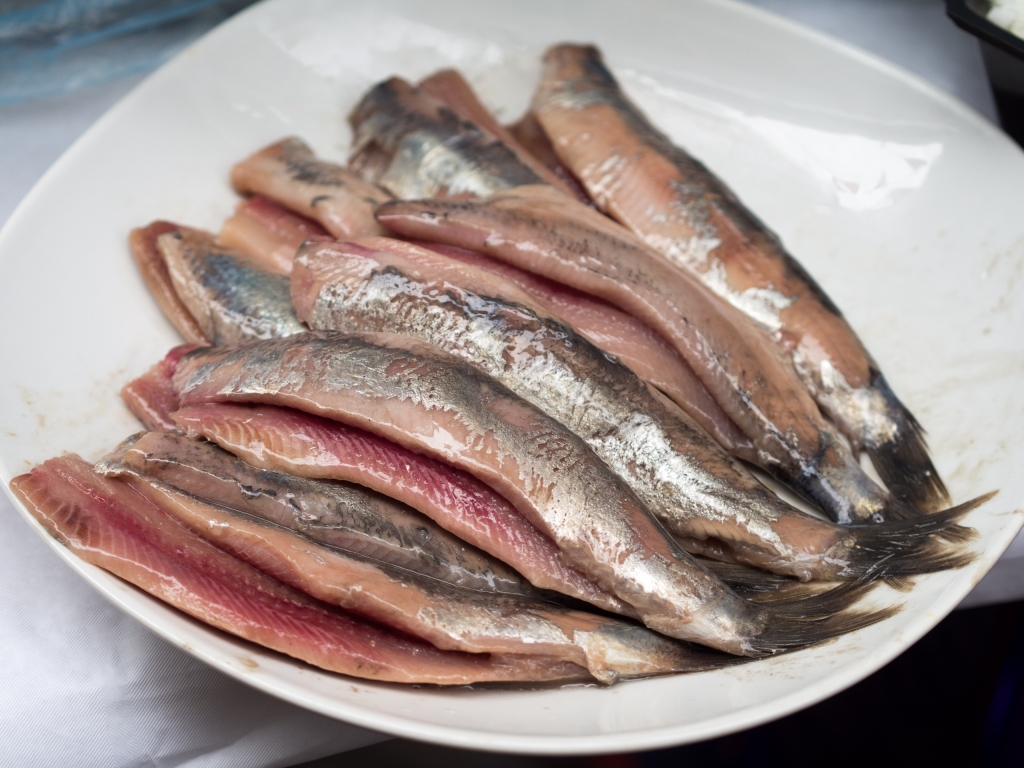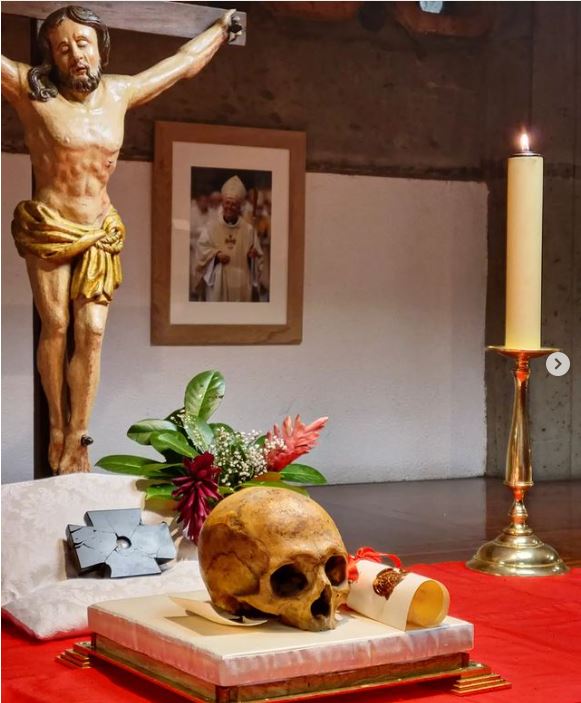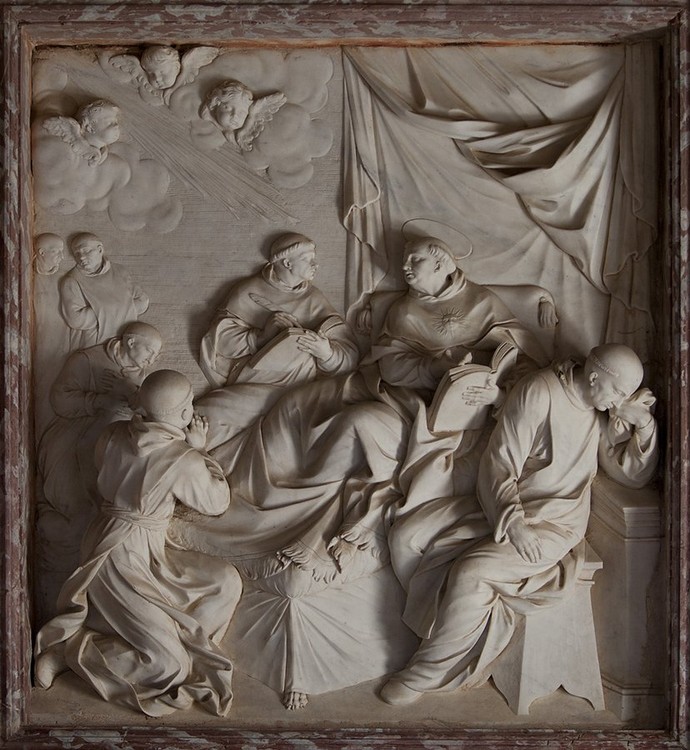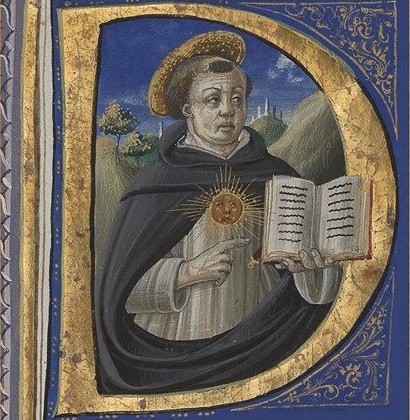Today, Tuesday, July 18, is the 700th anniversary of the Canonization of Saint Thomas Aquinas, which begins a two-year jubilee celebrating this great saint and covers the 750th anniversary of his death on March 7, 2024 and the 800th anniversary of his birth in 2025. The Vatican News Service reported that Pope Francis is sending Cardinal Marcello Semeraro, prefect of the Dicastery for the Causes of Saints, as special envoy to the celebration that will take place in Fossanova Abbey, the location of St. Thomas’s death.
Miracles
As this two-year jubilee begins with the 700th anniversary of canonization of Saint Thomas, I found among the accounts of the several inquiries into his life conducted as part of the canonization process the story of one miracle that I always found rather charming:

When Thomas lay sick in the castle of Maenza and was urged to eat something, he answered, ‘I would eat fresh herrings, if I had some.’ Now it happened that a peddler called just then with salted fish. He was asked to open his baskets, and one was found full of fresh herrings … But when the herrings were brought to Thomas, he would not eat them.
https://professorsblog.wordpress.com/2011/12/10/the-miracle-of-the-herrings/
Another witness tells the story thus:
Thomas said, ‘Do you think you could get me some fresh herrings?’ The socius replied, ‘Oh, yes, across the Alps, in France or England!’ But just then a fishmonger called Bordonario arrived at the castle [and] on opening the baskets, the man found one full of fresh herrings[, which] were unknown in Italy. And while the fishmonger was swearing that he had brought sardines, not herrings, brother Reginald ran off to tell Thomas, crying, ‘God has given you what you wanted – herrings!’
There has been some controversy about this one miracle (among the many) attributed to Saint Thomas, as though he received a sham-canonization on the basis of what must be one bogus miracle alone. But it is clear that these (several) inquiries concern (many, many) miracles which occurred during his life as a testament to his general, earthly sanctity. That he is among the blessed in heaven, however, has been established, as with all (non-martyred) saints, through the miracles proven to have taken place through his intercession after his death, of which there are indeed also many.
Indulgences
And what would a Jubilee be without Indulgences to be received? As the Catholic News Agency reports, the Holy See has granted a plenary indulgence to anyone “making a pilgrimage to a holy site connected to the Dominican Order to either take part in the jubilee celebrations or ‘at least devote a suitable time to pious recollection,’ concluding by praying the Lord’s Prayer, reciting the Creed, and invoking the intercession of the Blessed Virgin Mary and St. Thomas Aquinas. Any church, shrine, or chapel currently entrusted to the Dominican Order can meet the requirements for the pilgrimage.” So a trip to France or Italy is not required to fulfill the conditions of making the pilgrimage and receiving the remission of temporal punishments for sin. For the complete account of the requirements, including the ordinary conditions, please consult the CNA article.
Saint Thomas, of course, is on record as approving the theory and practice of indulgences:
Hence we must say on the contrary that indulgences hold good both in the Church’s court and in the judgment of God, for the remission of the punishment which remains after contrition, absolution, and confession, whether this punishment be enjoined or not. The reason why they so avail is the oneness of the mystical body in which many have performed works of satisfaction exceeding the requirements of their debts; in which, too, many have patiently borne unjust tribulations whereby a multitude of punishments would have been paid, had they been incurred. So great is the quantity of such merits that it exceeds the entire debt of punishment due to those who are living at this moment: and this is especially due to the merits of Christ: for though He acts through the sacraments, yet His efficacy is nowise restricted to them, but infinitely surpasses their efficacy.
Summa Theologiae, Supplementum, q. 25, a. 1
If you are unfamiliar or uncertain what indulgences are, how they contribute to salvation, and what their connection to purgatory is, you can read this brief explanation.
Relics

I had previously reported that the relics of the Angelic Doctor would be traveling from their resting place in Toulouse, France, to various locations for public veneration as part of this Jubilee. As I did in my first blog post to celebrate the Feast of Saint Thomas back in 2021, I remind readers that, as with indulgences, the beloved saint himself believed that the veneration of relics is a pious and fitting practice, despite the squeamishness it may provoke in us due to our modern sensibilities:
“Saint Thomas himself acknowledges that such devotion is right and fitting as it is an extension of the honor and veneration that ought to be given to the Body of Jesus Christ. It is indeed for the Angelic Doctor one of the furthest expressions of the Incarnation whereby lowly matter is exalted and made worthy of honor by being united with a very Person God as the saints were temples and instruments of God’s presence in this very material world.
Now it is manifest that we should show honor to the saints of God, as being members of Christ, the children and friends of God, and our intercessors. Wherefore in memory of them we ought to honor any relics of theirs in a fitting manner: principally their bodies, which were temples, and organs of the Holy Ghost dwelling and operating in them, and are destined to be likened to the body of Christ by the glory of the Resurrection. Hence God Himself fittingly honors such relics by working miracles at their presence.
Summa Theologiae, IIIa, q. 25, a. 6

I had mentioned in that 2021 post on the Feast of Saint Thomas that as a Dominican novice I was told that the body of Saint Thomas had remained incorrupt after his death, but that, in an effort to retain his earthly remains and keep them from his Dominican brothers, the Cistercian monks of Fossanova Abbey repeatedly moved his body within the monastery, until they boiled it down to bones and hid them within their walls. Marika Räsänen confirms this story from sources cited during the process of Saint Thomas’s canonization and recounted in a work I previously commended: Thomas Aquinas’s Relics as Focus for Conflict and Cult in the Late Middle Ages: The Restless Corpse.
Another good scholarly summary of what befell the relics of Saint Thomas is by Anton ten Klooster, “Due honor to their relics: Thomas Aquinas as Teacher and Object of Veneration,” (European Journal for the Study of Thomas Aquinas (37) 2019) which draws on the work of Mariska, among other sources.

Thank you for the thorough article on the double jubilee of the Angelic Doctor. Please correct the date in the first paragraph: his death–and feast day according to the Dominican Rite–is March 7th, not March 8th.
LikeLike
Thank you for your kind words and for pointing out the error. I have corrected it. God bless
LikeLike